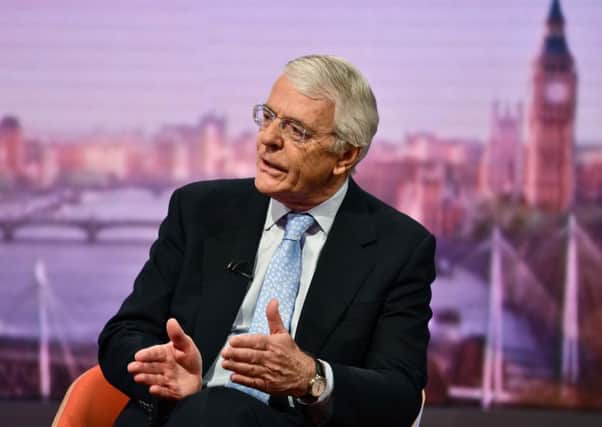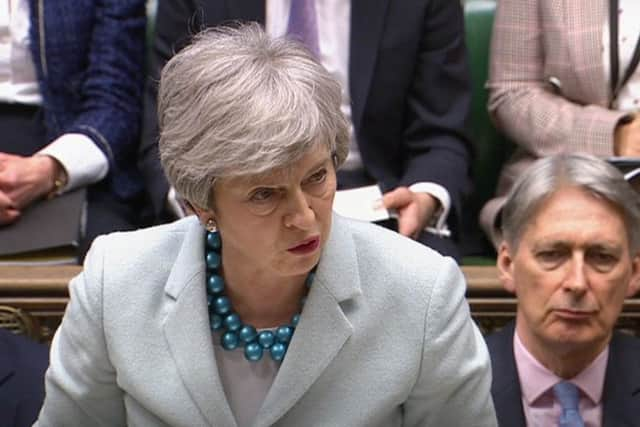Chris Moncrieff: Tories should heed Sir John Major’s advice over another snap Brexit general election


Every time she listens to a news bulletin, she must assume that things could hardly get worse for her than they already have.
Well, alas for her, that has happened.
It was the news, which just seemed to slip out, that Labour now lie five points ahead of the Conservatives in the opinion polls.


Advertisement
Hide AdAdvertisement
Hide AdWhen a few years ago, the arch left-winger Jeremy Corbyn was elected leader of the Labour Party, the Tories were throwing their hats in the air and whooping with glee.
But that joy was shortlived. Ill-advisedly Theresa May called a totally unnecessarily general election, assuming that the Tories’ slender majority in the Commons would expand to anything between 50 and 100 seats.
They believed (and indeed even some Labour MPs feared) that Corbyn would be routed at the polls. But in the event the Conservatives lost their majority in the Commons and the so-called “loser” Jeremy Corbyn achieved almost pop star status.
In the ensuing months, that popularity has not faded, even though his performances in the House of Commons have not, overall, been great. The Tories’ general election campaign, led by the colourless Theresa May, was so pathetic as to be laughable.
Advertisement
Hide AdAdvertisement
Hide AdAnd Corbyn, once briefly the laughing stock of Westminster, is now seen as a serious contender for the keys of Number 10. The Tories should be alarmed.
So those reckless Conservative MPs who, despite all this, are still clamouring for an early general election, would be well-advised to heed the unequivocal one-word advice of the former Tory premier Sir John Major. It was simply: “Don’t”.
IT has accurately been called the Parliament of Chaos, and might equally be named the Parliament of Shame and Dishonour. When the then Prime Minister David Cameron called the EU referendum, Parliament solemnly promised to adhere to the result.
Well, that has not happened. To their great shame, many MPs have broken that promise and have done everything in their power to prevent the referendum majority from getting its rightful way.
Advertisement
Hide AdAdvertisement
Hide AdThis is a scandal and those guilty of this campaign should not be allowed to forget it.
There is, apparently, honour among thieves, but not among our so-called political elite.
THE prospect of a Conservative Party leadership election merely has to be whispered before we are presented with unofficial lists of runners and riders, as numerous as the Grand National field.
Two possible runners, Boris Johnson and Jacob Rees-Mogg, have both in the past described the Prime Minister’s Withdrawal Agreement as reducing the UK to an EU vassal state.
Advertisement
Hide AdAdvertisement
Hide AdSuddenly, with the news that Theresa May may soon be leaving Downing Street, they have changed their tune. Both have suddenly decided that her Agreement would be better than nothing, and have chosen to support it.
It is scarcely surprising, therefore, that the British electorate is becoming a trifle cynical. I have spoken to many people who say they will never vote in a Parliamentary election again. What an indictment.
OVER the past few months, amid all the turmoil of Brexit, numerous junior or middle-rank Ministers have either been sacked or resigned.
Yet, the departments which each of these people represented, seem to have bumbled along happily, without any serious handicap, without them. In short, the Prime Minister has barely bothered to replace them.
Advertisement
Hide AdAdvertisement
Hide AdAll of which makes you wonder why the taxpayer has to fork out these relatively high salaries for people whose presence or absence seems to make no difference at all.
Some years ago, Belgium managed very nicely, thank you, without a government at all, while politicians argued endlessly over varying kinds of alliances to be able to form an administration with a working majority.
So would anyone be bothered or inconvenienced in even the slightest way if politicians decided to go on strike?
Chris Moncrieff is a former political editor of the Press Association.